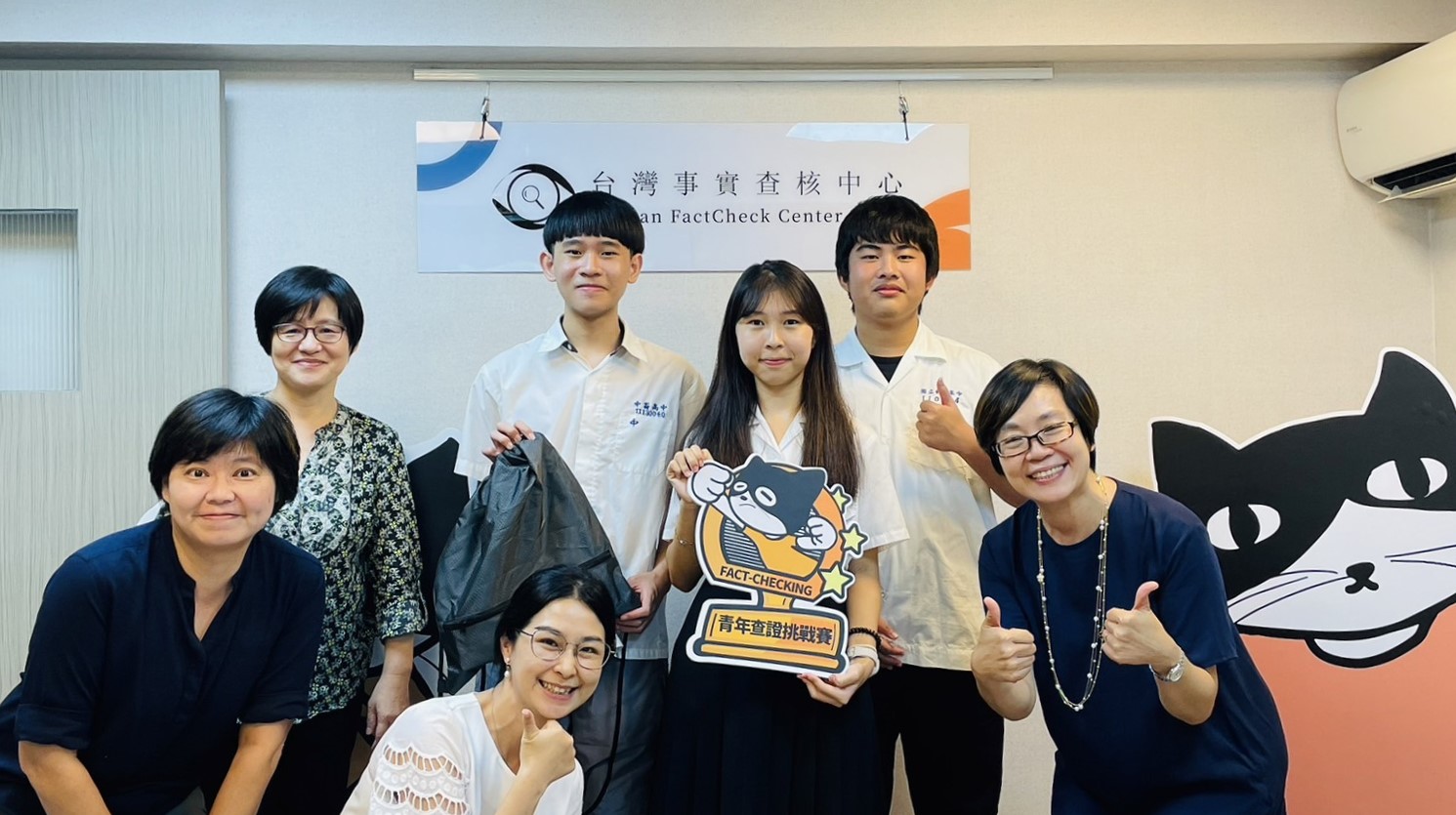Participation in the 2023 Youth Verification Challenge in the Mandarin-Chinese zone hit a record high, despite the cancellation of the Asia Pacific region version
From left: TFC Editor-in-Chief Summer Chen, Google News Lab Fellow Wei-Ling Huang, TFC Education Director Pauline Chen, Hong-Yu Lu from Zhonglun Senior High School, Wen-Chi Lin from Changhua Girls' Senior High School, Chang-Sheng Yeh from Changhua Senior High School, and TFC CEO Eve Chiu.
The Youth Verification Challenge in the Mandarin Chinese zone, organized by the Taiwan FactCheck Center, was one of two remaining local editions to hold the competition this year.
Riley Chou
Since its launch in 2021, the Youth Verification Challenge, initiated by Google News Initiatives and co-hosted by several local organizations in Asia Pacific region, has been an ongoing effort to raise awareness and enhance verification knowledge among youth. This year, following the cancellation of the Asia Pacific zone and regional editions in New Zealand, Australia, Thailand, Vietnam, and other countries, only two local editions remained: with Taiwan being one of them.
In the 2023 Mandarin-Chinese edition hosted by Taiwan FactCheck Center, participation reached a record high with 251 young individuals taking part. They came from Taiwan, Hong Kong, and North America and were affiliated with 44 universities and 30 high schools.
This year's competition specifically introduced the trending topic of generative AI and the use of Chat GPT, testing not only verification skills but also media literacy in the context of new technology.
The 2023 Youth Verification Challenge was conducted online, emphasizing the assessment of both media literacy and the use of technology.
The Rise of Young Talents from 13 Days and 2 Stages of the Competition
The rules remain consistent with previous years, comprising two testing stages. During the initial phase, participants are tasked with honing their verification skills. Subsequently, in the final stage, they are required to employ a variety of digital tools and keen observation to sidestep pitfalls in the questions, ensuring a successful search for the answers.
After 13 days of competition, the winning teams emerged on September 23, with first place going to Team CH(G)SH. This team consists of Chang-Sheng Yeh from Changhua Senior High School, and Wen-Chi Lin and Yu-En Chen from Changhua Girls' Senior High School.
Two out of the top three winning teams consisted entirely of high school students. This highlights the idea that individuals of any age or academic background have the capacity to improve their verification skills and attain proficiency.
Zhonglun Senior High School had the highest number of participants, with over 60 students joining the competition. Many of them mentioned that they were encouraged by their civics and social development teacher, Wen-Yen Chen. Initially, they joined with the goal of earning more grades, but later on, they found it enjoyable and competed wholeheartedly.
The competition questions for this year integrate ChatGPT, evaluating participants not just for their competence in verification tools but also for their competence in utilizing generative AI.
Student’s Call for Wider Integration of Verification Skills
“Verification is similar to uncovering the truth and comprehending the world shaped by internet information,” said Wen-Chi Lin from the first winning team.
She also shared her winning strategy was to pursue her interests and research-related topics, which helped her navigate the competition questions without getting stuck.
Hong-Yu Lu, a student from Zhonglun Senior High School and a member of the third-winning team, said, “I found ChatGPT to be a useful tool, but it's essential to investigate information thoroughly, or else we may acquire incorrect knowledge from it.”
Numerous students recognize the significance of verification skills and wish for their broader integration. Cheng-Ka Deng from Chupei High School expressed concern about the abundance of misinformation on Taiwan’s social media platforms and suggested incorporating more current events topics in the next competition.
Students also praised the “verification toolbox” organized by the Taiwan FactCheck Center as a valuable resource. They expressed their desire for their peers and seniors to acquire these skills as well.






